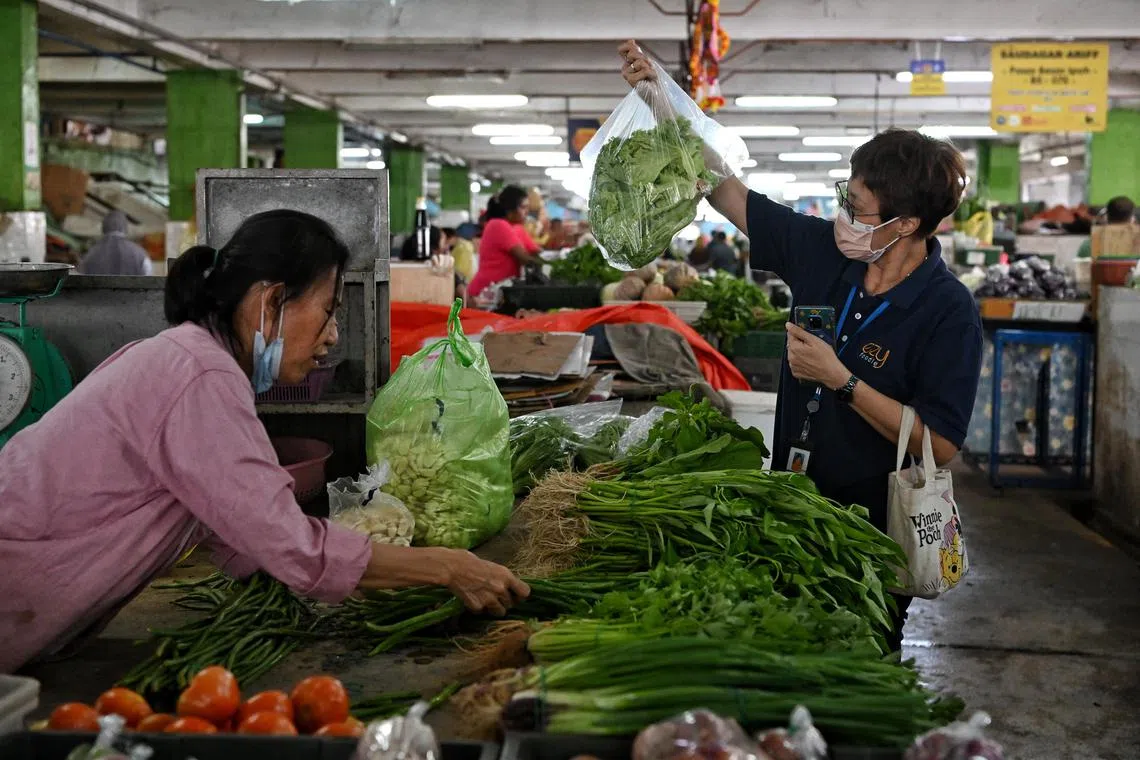Malaysia’s inflation moderates to 2% in July, lowest in 11 months
Sign up now: Get ST's newsletters delivered to your inbox

The slowdown in price gains of food, transport and selected services amid base effects, coupled with government subsidies, are the main reasons for decelerating inflation growth.
ST PHOTO: KUA CHEE SIONG
KUALA LUMPUR - Malaysia’s inflation rate eased to 2 per cent in July – the lowest rate of increase in nearly a year – partly due to the higher base in 2022.
The country’s headline inflation rate has been moderating since hitting a peak of 4.7 per cent in August 2022, said the Department of Statistics Malaysia (DOSM) on Friday.
The latest inflation rate is lower than the projection of 2.1 per cent by 21 economists in a recent Reuters poll. It is also lower than the 2.4 per cent recorded in June.
Core inflation, which excludes volatile items and those with government-administered prices, fell to 2.8 per cent in July from 3.1 per cent in June. Last week, Bank Negara Malaysia governor Abdul Rasheed Ghaffour said both headline and core inflation are expected to moderate over the course of 2023. He expects the monthly inflation rate to average between 2.8 per cent and 3.8 per cent.
Economists said the persistent slowdown in price gains of food, transport and selected services amid base effects, coupled with government subsidies, was the main reason for decelerating inflation growth.
In a co-authored report, UOB economists Julia Goh and Loke Siew Ting said they expect Malaysia’s inflation to hover around 2 per cent in coming months, in view of unchanged subsidy policies by the government and an absence of global supply shocks.
“The moderating inflation growth also indicated that the full impact of past interest rates continues to manifest while the pent-up demand wanes,” they added.
In view of easing inflation and slower-than-expected gross domestic product growth in the second quarter of 2023, they expect Bank Negara Malaysia to keep the interest rate unchanged at 3 per cent in the next Monetary Policy Committee meeting in early September.
MIDF Research viewed the moderation of inflationary pressure as a positive signal, especially for domestic demand to stay on an expansionary path in coming months.
“However, persistently high domestic food inflation remains a downside risk factor amid climate change and geopolitical war impacts on global agriculture output,” it said on Friday.
The DOSM report indicated that 416 out of 552 items – or 75.4 per cent of items – in the index experienced price increases in July. Among these, the prices of 17 items went up by more than 10 per cent.
Prices of food and non-alcoholic beverages, which constitute 29.5 per cent of the total consumer price index (CPI), increased 4.4 per cent in July from a year earlier.
Prices of housing, water, electricity, gas and other fuels – contributing 23.8 per cent of the total CPI – rose 1.7 per cent.
Overall, Malaysia’s inflation rate in July remained lower than that in several Asia-Pacific countries. The Philippines had one of the higher rates at 4.7 per cent, Indonesia’s was 3.1 per cent, Vietnam 2.1 per cent and South Korea 2.3 per cent.
The euro zone experienced inflation of 5.3 per cent and the United States 3.2 per cent.
OctaFX financial market analyst Ang Kar Yong said that compared with other markets in the region, Malaysia’s positive growth outlook – anchored by an improving job market and strong domestic demand – as well as falling inflation growth will draw the market’s attention to the ringgit.
In the near term, he expects the ringgit to appreciate, reaching RM4.52 (S$1.32) or possibly lower against the US dollar.
The ringgit has depreciated over 5 per cent against the greenback in the year to date. THE BUSINESS TIMES


